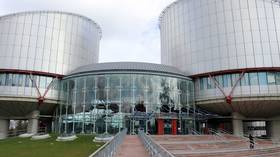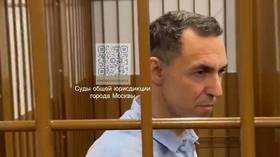ECHR orders Russia to compensate ‘foreign agents’

The European Court of Human Rights (ECHR) has ordered Russia to pay out hundreds of thousands of euros in compensation to 107 organizations and individuals it has designated as ‘foreign agents’. Russia rejected the court’s jurisdiction after leaving the Council of Europe in 2022.
Russia’s foreign agent law, similar to the US Foreign Agents Registration Act (FARA) of 1938, was first adopted in 2012 and expanded in 2022. It requires anyone who receives support from abroad or is under the influence of entities from outside the country to register and be labeled as such.
The designation does not ban persons or entities from operating in Russia, but introduces a range of restrictions. Those in violation of the law face fines of up to 5 million rubles and up to six years in prison.
Russian State Duma Chairman Vyacheslav Volodin has explained that the law is necessary in order to protect the country’s sovereignty and “prevent outside interference in internal affairs.”
A number of the individuals and organizations have since filed a joint complaint with the ECHR, including US state-funded network Radio Liberty/Radio Free Europe, the International Memorial and the Memorial Human Rights Center, journalist Yuri Dud, opposition activist Lyubov Sobol, who is also designated as an extremist by Moscow, and political scientist Ekaterina Shulman.
In a ruling published on Tuesday, the ECHR claimed that the law violates the rights of NGOs, media organizations, and individuals by introducing “restrictions on their freedom of expression and association” and infringing on the individual applicants’ “right to respect for private life.” The court also claimed that those who received the designation have been “discriminated against and subjected to restrictions” that are not in line with the ECHR’s conventions.
“The Court held that Russia was to pay the applicants amounts ranging from 5,500 euros (EUR) to EUR 10,000 [$5,900-$10,700] in respect of non-pecuniary damage, and various other amounts in respect of pecuniary damage and costs and expenses, indicated in the appendix to the judgment,” the ECHR said in a press release outlining the ruling.
Russia has yet to comment on the ECHR’s decision, having ceased to be party to the court in September 2022. The move came after Russia left the Council of Europe (COE), accusing the body of taking a blatantly anti-Russian stance and turning into an “obedient instrument” of the West, while becoming immersed in “double standards.”
Last year, in light of the ECHR accepting complaints from individuals and entities declared ‘foreign agents’ by Moscow, Deputy Foreign Minister Sergey Vershinin described the court as a “mad printer rubber-stamping politically charged complaints against Russia,” while “censoring” any cases considered to be linked to Russian interests.













